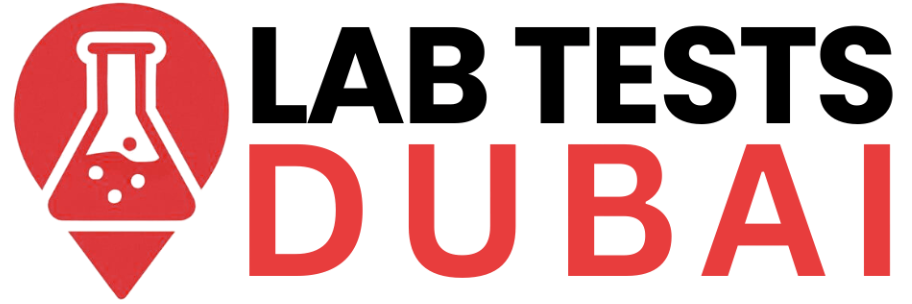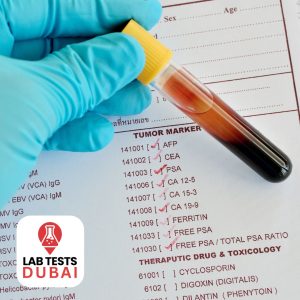
Triple Test Prenatal Screening – Comprehensive Maternal & Fetal Health Check
650,00 د.إ
The Triple Test: Comprehensive Screening for Maternal and Fetal Health is a non-invasive prenatal blood test that evaluates three key biomarkers—AFP, hCG, and estriol—to assess the risk of fetal chromosomal abnormalities such as Down syndrome and neural tube defects.
Sample Type : Serum
Methodology : Enzyme-immunoassay
TAT : 3 Days
Description
Triple Test Prenatal Screening – Comprehensive Screening for Maternal and Fetal Health
The Triple Test from Lab Tests Dubai is a critical second-trimester prenatal screening that evaluates the risk of chromosomal abnormalities and fetal structural defects by measuring three key hormones in the mother’s blood:
- Alpha-fetoprotein (AFP)
- Human Chorionic Gonadotropin (hCG)
- Unconjugated Estriol (uE3)
Performed between weeks 15 and 20 of pregnancy, this non-invasive serum test helps assess the likelihood of:
- Down Syndrome (Trisomy 21)
- Edwards Syndrome (Trisomy 18)
- Neural Tube Defects (e.g., spina bifida, anencephaly)
Using high-precision enzyme-immunoassay technology, the Triple Test delivers reliable results within just 3 days, enabling timely follow-up with detailed ultrasound, amniocentesis, or NIPT (Non-Invasive Prenatal Testing) if needed.
Available with home blood collection, Lab Tests Dubai ensures accurate, private, and stress-free prenatal screening—so you can monitor your baby’s development with confidence.
Why You Need This Test
If you’re in your second trimester, this test could reveal early signs of serious fetal conditions—giving you time to prepare and plan.
You need the Triple Test if:
- You’re 15–20 weeks pregnant (optimal window)
- You’re over 35 years old (increased chromosomal risk)
- You have a family history of genetic disorders
- You’ve had a previous pregnancy with chromosomal abnormalities
- You’re unable to access or afford NIPT (non-invasive prenatal testing)
- Your ultrasound showed soft markers (e.g., increased nuchal fold)
While the Triple Test is not diagnostic, it provides a risk assessment that helps guide next steps:
- Low risk → Reassurance
- High risk → Referral for amniocentesis or detailed anomaly scan
Early screening = more time for informed decisions.
Symptoms That Indicate This Test
The Triple Test is not symptom-based—it’s a routine prenatal screening recommended for all pregnant women, especially those with:
✅ Advanced maternal age (35+)
✅ Family history of birth defects
✅ Exposure to teratogens (e.g., certain medications, infections)
✅ Diabetes or chronic illness
✅ Abnormal first-trimester screening results
✅ Suspicious ultrasound findings
Even if you feel healthy and your pregnancy is progressing normally, silent fetal conditions can be developing—this test helps detect them early.
Natural Production: How AFP, hCG & Estriol Reflect Fetal Health
Each marker in the Triple Test is naturally produced during pregnancy:
🔹 Alpha-fetoprotein (AFP)
- Produced by the fetal liver
- Enters maternal blood via amniotic fluid
- High AFP → Possible neural tube defect (e.g., spina bifida)
- Low AFP → Possible Down syndrome
🔹 Human Chorionic Gonadotropin (hCG)
- Produced by the placenta
- High hCG → Strongly associated with Down syndrome
- Low hCG → May indicate Trisomy 18
🔹 Unconjugated Estriol (uE3)
- Made by the fetal liver and placenta
- Low uE3 → Linked to Down syndrome, Trisomy 18, or steroid metabolism disorders
These markers are combined with:
- Maternal age
- Weight
- Ethnicity
- Gestational age (by ultrasound)
…to calculate a personalized risk score (e.g., 1 in 250).
What Happens If Untreated or Ignored? Risks of Skipping Prenatal Screening
Ignoring abnormal Triple Test results can lead to:
⚠️ Undiagnosed Neural Tube Defects – leading to stillbirth or lifelong disability
⚠️ Unprepared Birth of a Child with Down Syndrome – no early intervention or support planning
⚠️ Missed Trisomy 18 Diagnosis – a condition with high infant mortality
⚠️ Emergency Delivery Without Neonatal Care Ready
The good news? Early detection allows for:
- Specialized delivery planning (tertiary care hospital)
- Neonatal intensive care readiness
- Parental counseling and support
- Informed decisions about pregnancy continuation
This test is not about fear—it’s about preparedness and choice.
How to Prepare for the Test
Preparing for the Triple Test is simple:
✅ No fasting required
✅ Continue your regular prenatal vitamins
✅ Provide accurate gestational age (best confirmed by ultrasound)
✅ Inform your doctor of:
- Diabetes or liver disease
- Multiple pregnancy (twins)
- Smoking status (affects hCG and uE3)
A serum blood sample is collected via standard draw—available at our labs or via home collection.
Test Overview: Enzyme-Immunoassay Methodology
| Feature | Details |
| Test Name | Triple Test – AFP, hCG, uE3 |
| Sample Type | Serum (Blood) |
| Methodology | Enzyme-Immunoassay (EIA) |
| Turnaround Time (TAT) | 3 Days |
| Category | Hormone/Tumor Marker / Prenatal Screening |
| Purpose | Screen for Down syndrome, Trisomy 18, neural tube defects |
| Testing Location | Lab Tests Dubai – Accredited Labs & Home Collection Across UAE |
Risk Interpretation:
- Low Risk: <1 in 250 (e.g., 1 in 1,000)
- High Risk: ≥1 in 250 (e.g., 1 in 100)
Follow-Up for High Risk:
- Detailed anomaly ultrasound (Level II)
- Amniocentesis with karyotyping
- NIPT (cell-free DNA testing)
Results are reported as Multiples of Median (MoM) and personalized risk score.
FAQs About the Triple Test
Q: Is the Triple Test the same as NIPT?
A: No. NIPT analyzes fetal DNA in maternal blood (more accurate). Triple Test uses hormone levels (less sensitive but more affordable).
Q: Can I take it earlier than 15 weeks?
A: No. 15–20 weeks is the optimal window. Before that, hormone levels are too low.
Q: Does a high-risk result mean my baby has a problem?
A: No. It means higher statistical risk—most high-risk results are false positives. Confirm with amniocentesis.
Q: Can I book without a doctor’s referral?
A: Yes! Lab Tests Dubai allows direct online booking—ideal for proactive prenatal care.
Q: How will I get results?
A: A secure digital report is emailed within 3 business days, including MoM values and risk assessment.
Q: Is this test covered by insurance?
A: Yes. Prenatal screening is medically necessary—fully covered by all UAE insurers.
If you’re 15–20 weeks pregnant, the Triple Test gives you the answers you need in just 3 days—so you can make informed choices about your baby’s health.



Reviews
There are no reviews yet.